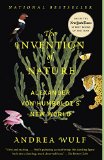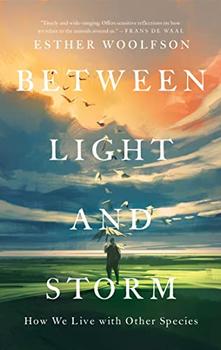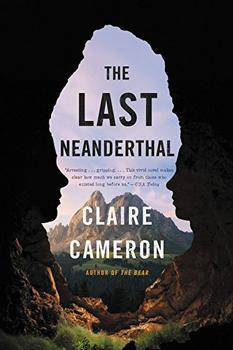Summary | Excerpt | Reviews | Beyond the book | Read-Alikes | Genres & Themes | Author Bio

Alexander von Humboldt's New World
by Andrea WulfImagine, for a moment, that you are somehow transported in time about 150 years into the future. Once there, you try to get your bearings, asking your new contemporaries questions about what became of your world. And in the course of this conversation, you throw out names of famous people from your time – Tiger Woods, Meryl Streep, Donald Trump – only to be greeted with blank stares. How could figures of such popularity possibly be forgotten, you wonder. "I mean, Trump had his name on, like, everything," you protest. "How could someone that famous be forgotten?"
Good question. Here's a better one you'll certainly be asking if you read Andrea Wulf's book: How could Alexander Von Humboldt be forgotten by our time? The Invention of Nature: Alexander Von Humboldt's New World makes the case that Humboldt was one of the most famous and influential people in the 19th century. After every chapter, readers – most of whom have probably never heard of Humboldt – are likely to shake their heads and wonder how this guy ever faded into obscurity. His lifetime of work and discovery remains profoundly important and is apparent in many aspects of daily contemporary life, from weather maps on the nightly news (he invented those curvy temperature lines called "isobars") to the debate about climate change.
In the course of his remarkably productive life (1769-1859) as a scientist and adventurer, Humboldt was, according to Wulf's exhaustively researched book, kind of like a genius Forrest Gump – he kept affecting history everywhere: He was a major influence on Wordsworth, Coleridge, and the British Romantic movement; Edgar Allan Poe dedicated a work to him, and Thomas Jefferson relied on him for information he then used in international diplomacy; the German poet Goethe partly based the character Faust upon him, Charles Darwin worshipped him and got his ideas about natural selection from him, and Henry David Thoreau used his work as a model for Walden. Reading the book, one begins to understand why there are "mountain ranges in northern China, South Africa, New Zealand, and Antarctica," named after him, as well as "rivers and waterfalls in Tasmania and New Zealand...In North America alone, four counties, thirteen towns, mountains, bays, lakes and rivers are named after him, as well as the Humboldt Redwoods State Park in California and Humboldt Parks in Chicago and Buffalo. The state of Nevada was almost called Humboldt."
The Invention of Nature hews closely to the standard biographers' template, tracing the subject from birth to death. Humboldt was born into a wealthy Prussian aristocratic family, lost his father at an early age, was guided by a stern mother pressuring him to succeed, educated by esteemed but humorless private tutors, found release in the beauty of nature, became a kind of itinerant naturalist in his teens, traveled the globe climbing volcanoes and tromping through the tropics, all the while taking extraordinarily copious notes that he would turn into over-stuffed volumes covering horticulture, animal life, climatology, and astronomy, splitting his time between Berlin, Paris, and whatever far-flung expedition to which he could attach himself and his inheritance. He was also an autodidact, teaching himself almost everything he knew through first-hand observation.
Wulf argues that Humboldt's particular genius was his ability to write about the facts of the natural world while still imbuing his work with a lyricism, a poetry even, that kept his books from being mere catalogs of flora and fauna, turning his scientific observations into meditations on mankind's place in the cosmos. Speaking of his breakthrough 1807 volume, an international bestseller published in eleven languages, Wulf asserts that:
With Views of Nature, Humboldt created a completely new genre – a book that combined lively prose and rich landscape descriptions with scientific observation in a blueprint for much nature writing today...Humboldt showed how nature could have an influence on people's imaginations. Nature, he wrote, was in a mysterious communication with our 'inner feelings.' What we might take for granted today – that there is a correlation between the external world and our mood – as a revelation to Humboldt's readers. Poets had engaged with such ideas but never a scientist.
With almost a hundred pages of explanatory notes and a bibliography extensive enough to comprise a near-lifetime of reading for even avid readers, The Invention of Nature is a serious book about a seriously important figure, though it never really transcends standard biography; we learn how much this guy did but there's not much here to tell us why he did the things he did. Nevertheless Wulf certainly makes her case, establishing the singular significance of a man whose work was etched in stone but whose name was written on the shifting sands of time.
![]() This review was originally published in The BookBrowse Review in October 2015, and has been updated for the
November 2016 edition.
Click here to go to this issue.
This review was originally published in The BookBrowse Review in October 2015, and has been updated for the
November 2016 edition.
Click here to go to this issue.

If you liked The Invention of Nature, try these:

by Esther Woolfson
Published 2022
A landmark examination of the fraught relationship between humans and animals, taking the reader from Genesis to climate change.

by Claire Cameron
Published 2018
From the author of The Bear, the enthralling story of two women separated by millennia, but linked by an epic journey that will transform them both.






Your guide toexceptional books
BookBrowse seeks out and recommends the best in contemporary fiction and nonfiction—books that not only engage and entertain but also deepen our understanding of ourselves and the world around us.